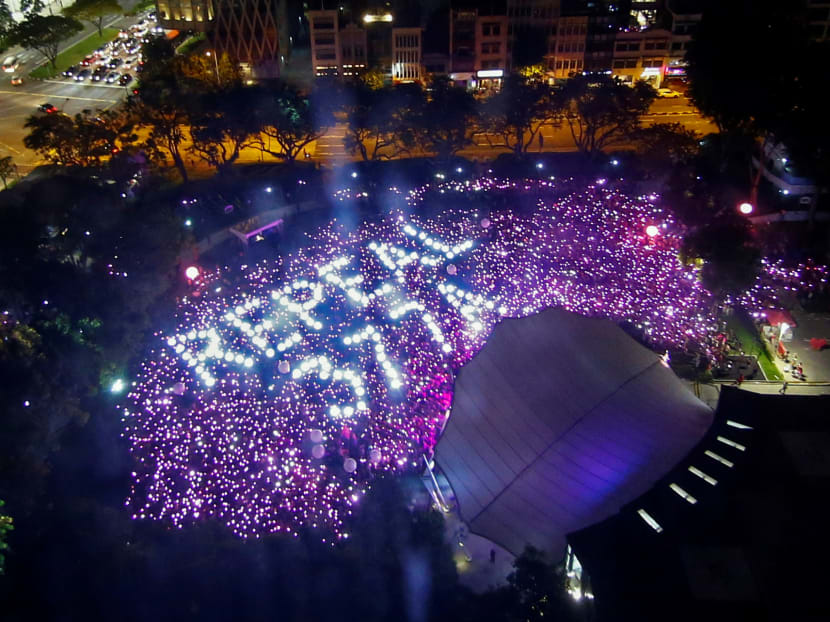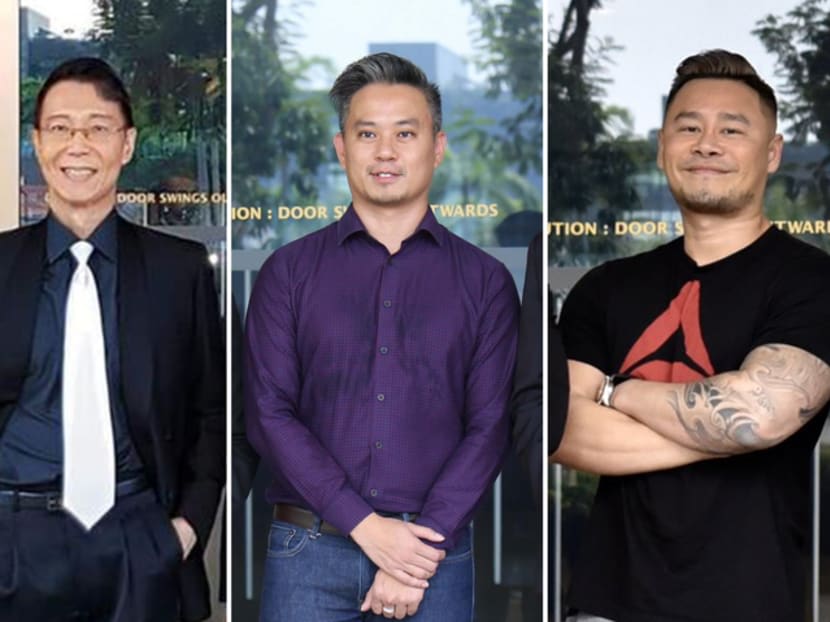Apex court dismisses challenges to Section 377A, says it's ‘unenforceable in its entirety’ and poses no threat of prosecution
SINGAPORE — The nation’s highest court has ruled that Section 377A of the Penal Code, which criminalises consensual sex between men, cannot be enforced in its entirety until the Attorney-General (AG) “provides clear notice” of two things in his capacity as the Public Prosecutor.

At the Speakers' Corner in Hong Lim Park in 2019, participants of Pink Dot, an annual event organised in support of the lesbian, gay, bisexual and transgender community, gathered in a formation that called for a repeal of Section 377A of the Penal Code.
- Five judges from the Court of Appeal dismissed constitutional challenges to the law that criminalises consensual sex between men
- They noted a “political compromise” Parliament had made in 2007 when the prime minister said the Government would retain Section 377A but not enforce it
- In 2018, Attorney-General Lucien Wong then said it was not in the public interest to prosecute two consenting adults in a private place
- The apex court acknowledged that uncertainty over protection from prosecution has left gay men “unable to plan their lives adequately”
- They thus ruled that Section 377A cannot be enforced on two conditions
SINGAPORE — The nation’s highest court has ruled that Section 377A of the Penal Code, which criminalises consensual sex between men, cannot be enforced in its entirety until the Attorney-General (AG) “provides clear notice” of two things in his capacity as the Public Prosecutor.
These are: The AG’s intention to reassert his right to enforce Section 377A proactively by way of prosecution, and the AG will no longer abide by a 2018 stance that it would not be in the public interest to prosecute based on the conduct of two consenting adults in a private place.
This ruling was handed down on Monday (Feb 28), as five Court of Appeal judges released their judgement on three legal challenges to Section 377A — the second time in a decade that it has ruled on the matter.
Three gay men had challenged the constitutionality of Section 377A, following an Indian court’s decision to lift a ban on consensual gay sex in September 2018. They then appealed the High Court's dismissal of the challenges.
Chief Justice Sundaresh Menon, who delivered the 152-page judgement on behalf of the apex court, said that it was unnecessary for the court to address the constitutional questions given its position on the enforceability of Section 377A.
However, it ruled that the appeals were unmeritorious and dismissed them, agreeing with High Court judge See Kee Oon that Section 377A did not deprive a person of “life or personal liberty” under Article 9(1) of the Constitution of Singapore.
“(The appellants) do not face any real and credible threat of prosecution under Section 377A at this time and therefore do not have standing to pursue their constitutional challenges to that provision,” Mr Menon added.
He then stressed that any judicial ruling on Section 377A “ought to concern only its legality or constitutionality and cannot extend to the policy merits or socio-political desirability of retaining or repealing” it.
The challenges were mounted by disc jockey Johnson Ong Ming, 45; former executive director of advocacy group Oogachaga Bryan Choong, 44; and retired general practitioner Roy Tan Seng Kee, 62.

PARLIAMENT STRUCK POLITICAL COMPROMISE
In the apex court’s judgement, Mr Menon noted that any discussion on the constitutionality of Section 377A cannot ignore the terms, purpose and consequences of the political compromise that was struck in Parliament in 2007.
Section 377A was retained because Parliament judged that it was undesirable to repeal it, but Prime Minister Lee Hsien Loong said the Government would not proactively enforce it.
Following India’s ruling in 2018, the current AG — Senior Counsel Lucien Wong — made clear that the Public Prosecutor’s exercise of prosecutorial discretion “has always been, and remains, unfettered”. However, Mr Wong added that prosecution remains out of the public interest if it involves two consenting adults in a private place.
Mr Menon listed some points on the political reality surrounding Section 377A:
- Although it was retained in Singapore's statute books, it was on the terms that it would not be proactively enforced
- The reason for retaining the law in 2007 "says nothing" about why it was enacted
- Instead, the retention was "directed at addressing a deeply divisive socio-political issue in a pragmatic way"
- The purpose of the political compromise reached in 2007 was to "strike a careful balance between the opposing interests of various groups"
He added: "The Government’s evident unwillingness to repeal Section 377A signals its assessment that society has yet to adequately integrate the opposing views of mainstream conservatives and the homosexual community, as well as its awareness that our multi-racial, multi-lingual and multi-religious community remains vulnerable along such fault lines.
"The Government was especially cognisant that forcing the issue would polarise those who are 'presently willing to live and let live’.”
The apex court acknowledged that the scope of legal protection from prosecution under Section 377A was ambiguous and the source of such protection was also “murky”.
One of Mr Choong’s lawyers, Senior Counsel Harpreet Singh Nehal, had also argued in his appeal that the Government’s position was unsettling because it was not binding on future AGs.
Mr Menon noted: “Such uncertainty leaves homosexual men unable to plan their lives adequately as they do not know, with reasonable certainty, how Section 377A will be applied or enforced.”
In order to minimise such “legal untidiness”, the Court of Appeal thus held that Section 377A is unenforceable in its entirety unless and until the AG of the day provides clear notice that he, in his capacity as the Public Prosecutor:
- Intends to reassert his right to enforce Section 377A proactively by way of prosecution
- Will no longer abide by the representations made by Mr Wong in 2018 as to the prosecutorial policy on sexual acts between two consenting adult men in private
This would give practical legal effect to the Government’s political compromise and the legitimate expectation caused by Mr Wong’s representations, Mr Menon said.
“Such uncertainty leaves homosexual men unable to plan their lives adequately as they do not know, with reasonable certainty, how Section 377A will be applied or enforced.Chief Justice Sundaresh Menon, on behalf of the Court of Appeal”
VIEWING SECTION 377A AS 'MORALLY JUSTIFIED'
The apex court then considered the various arguments put forth by the three men’s lawyers.
Mr Ong was represented by Mr Eugene Thuraisingam, Mr Suang Wijaya, Mr Johannes Hadi and Mr Joel Wong from law firm Eugene Thuraisingam LLP, while Mr Choong’s team of lawyers included Mr Singh, Mr Remy Choo, Ms Priscilla Chia and Mr Wong Thai Yong.
Dr Tan was represented by human rights lawyer M Ravi, who was also involved in the first series of Section 377A challenges in 2014.
On Mr Thuraisingam’s and Mr Ravi’s arguments that sexual orientation cannot be wilfully changed and is not caused or influenced by socio-environmental factors, the apex court said that it was not within the court’s remit to decide this.
Even if the court found that one cannot voluntarily change one’s sexual orientation, it did not necessarily follow that Section 377A must be unconstitutional, Mr Menon said.
Mr Singh and Mr Ravi had also argued that the legislative purpose of Section 377A was to suppress male prostitution. Mr Singh further argued that it was only intended to criminalise non-penetrative sex acts.
However, in examining material from the 1930s, the apex court found that Section 377A's legislative purpose was instead to “safeguard public morals generally”.
The five judges also considered Mr Thuraisingum’s argument on Section 377A being "absurd” and therefore not valid under Article 9(1) of the Constitution.
They noted that “many reasonable people” viewed Section 377A as “morally justified”.
Mr Menon said: “Numerous parliamentarians spoke up in favour of retaining (it), often on the ground of safeguarding societal morality and with the recognition that a sizeable segment of our society regards homosexual behaviour as unacceptable.”
Section 377A thus does not deprive someone of his personal liberty under the Constitution, Mr Menon added.
The court also rejected Mr Ravi’s argument that Section 377A infringed upon the right to freedom of speech under Article 14(1)(a) of the Constitution, by creating a "chilling effect" on gay rights advocacy.
Mr Menon said that the mere fact of a particular cause or activity being illegal does not in and of itself generate such an effect. He noted that gay rights activism and advocacy continue to exist in Singapore in a variety of forms such as the annual Pink Dot SG event.
“While gay rights advocates may face challenges in their work, it is likely that their difficulties stem in large part from general societal attitudes, as opposed to the continued retention of Section 377A in particular,” Mr Menon added.
He noted: “Section 377A has long been a lightning rod for polarisation, in large part because it raises a wider question, which admits of no ready answers, of how a State can best maintain harmony between different communities with deeply held, and sometimes conflicting, views on important issues of moral conscience.
"As the socio-political debate over Section 377A continues, the balance between various interests in society grows more delicate, and the need to create space for peaceful co-existence too becomes more pressing.”
The court did not make any order for costs given the “unusual nature of the proceedings, the important questions of public interest that were raised and the findings that we have arrived at”.
The coram of five judges also included Judges of Appeal Andrew Phang, Judith Prakash, Tay Yong Kwang and Steven Chong.











